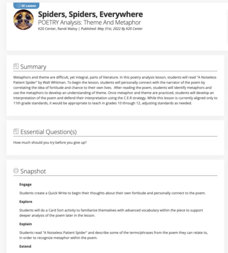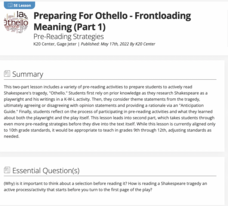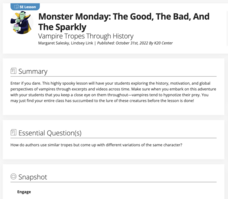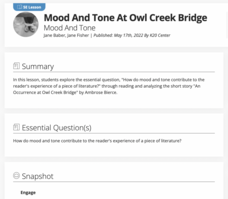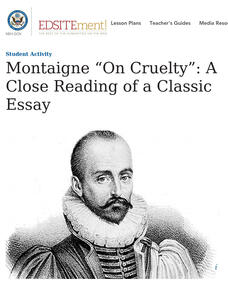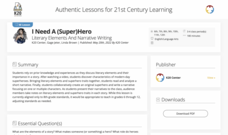The New York Times
Stress Less: Understanding How Your Mind and Body Respond to Anxiety
What could be more relevant to teens and preteens than experiencing stress? Use an article from the New York Times website to practice valuable Common Core skills for informational text reading, and also get a discussion going in your...
Texas Education Agency (TEA)
Evaluating the Effectiveness of Arguments, i.e., Identify Fallacies (English III Reading)
A series of interactive exercises provide users with the ammunition they need to detect logical fallacies and defend themselves against persuasion. Learners read about 11 types of logical fallacies and identify the type used in sample...
Texas Education Agency (TEA)
Distinguishing Between Inductive and Deductive Reasoning (English III Reading)
Is Sherlock Holmes an inductivist or a deductivist? Users of this interactive to distinguish between inductive and deductive reasoning. They consider in various situations whether it is better to list evidence and then introduce a claim...
Texas Education Agency (TEA)
Annotating to Deepen Understanding (English III Reading)
An interactive resource teaches readers how to annotate all kinds of texts. After reading an introduction that stresses the benefits of text annotations, users examine several models and then demonstrate what they have learned by...
K20 LEARN
Voices from the Past: History and Literature
Art can enhance the understanding of history. That's the big idea in a lesson that has young scholars read Randall Jarrell's poem "The Death of the Ball Turret Gunner" and an excerpt from John Hersey's Hiroshima, which provide a...
K20 LEARN
Things Are Lit at Thornfield: Jane Eyre
Jane Eyre offers scholars an opportunity to practice reading comprehension skills. Pairs are assigned a word from the text, use their prior knowledge, and consider the context, connotation, and denotation of the word to posit a...
K20 LEARN
"The Interlopers": Are You Ready to Rumble? Conflict, Motivation, and Setting
Capulets and Montagues. Sharks and Jets. Nortenos and Surenos. Gradwitzes and Znaeyms? Hector Hugh Munro's short story "The Interlopers" invites high schoolers to consider the causes of conflicts and reflect on what it takes to resolve...
K20 LEARN
Spiders, Spiders, Everywhere: Poetry Analysis - Theme And Metaphor
Walt Whitman's poem "A Noiseless Patient Spider" provides high schoolers an opportunity to reflect on the importance of perseverance and fortitude. After drafting a Quick Write about a time they tried and tried again to accomplish...
K20 LEARN
Preparing for Othello - Frontloading Meaning (Part 1): Pre-reading Strategies
The success of any lesson based on a complex text relies heavily on what instructors do before beginning the reading. Before reading Othello, scholars engage in a series of pre-reading activities, including completing an anticipation...
K20 LEARN
Monster Monday - The Good, the Bad, and the Sparkly: Vampire Tropes through History
Fangs, capes, pale skin, and beady eyes! High schoolers investigate the tropes associated with vampires by examining excerpts from stories and films. They then create a timeline that reveals how the depictions of vampires have evolved...
K20 LEARN
The History of Spoken Word Poetry: Historical and Cultural Perspectives In Literature
Spoken word poetry, more than almost any other form, reveals the historical and cultural perspective of the poet. High schoolers listen to various spoken word poems, select one to research in-depth, and then apply what they have learned...
K20 LEARN
Mood and Tone at Owl Creek Bridge: Mood and Tone
Two versions of movie trailers for the film Mary Poppins launch a supercalifragilisticexpialidocious lesson plan about how mood and tone impact a reader's experience of work. Using the provided list, readers identify the words that...
K20 LEARN
Memory Haiku: The Great Gatsby and the Sense of Smell
Scholars learn how smells evoke early childhood memories and apply that knowledge to a character from F. Scott Fitzgerald's The Great Gatsby. After finding a passage from the novel that references smells, they craft a haiku and a...
K20 LEARN
It Wasn't Me: "The Crucible"
Scholars complete their study of the collective fear in Arthur Miller's "The Crucible" by conducting a mock trial to determine how many witches are in the class. Groups then analyze sections of the play for the literary devices used and...
K20 LEARN
It’s My Party and I’ll Hear What I Want To: Gatsby’s Party Playlists, The Great Gatsby and the Sense of Sound
Young scholars consider how film soundtracks can help support not only the mood but also the tone of a scene. After viewing two very different trailers for the same film, class members create their own soundtracks for two party scenes...
K20 LEARN
The Consequences of Time Travel: Analyzing Short Stories
Ray Bradbury's short story "A Sound of Thunder" is the anchor text in a lesson that asks high schoolers to find examples of cause, effect, and foreshadowing in the tale. They then create a brochure advertising trips with Time Travel, Inc.
K20 LEARN
The New Colossus: Determining Author's Perspective
Introduce young scholars to the concept of the author's perspective with a instructional activity that uses Emma Lazarus's poem, "The New Colossus," as the anchor text. Groups use a T-chart to identify words that reveal the author's...
K20 LEARN
The Eyes of Dr. T. J. Eckleburg: The Great Gatsby and the Sense of Sight
To conclude a study of The Great Gatsby, class members create a multimodal project that represents what they feel the eyes of Dr. T.J. Eckleburg see about the hidden side of one of the characters in F. Scott Fitzgerald's classic novel....
National Endowment for the Humanities
Montaigne “On Cruelty”: A Close Reading of a Classic Essay
An excerpt from Michel de Montaigne's essay "On Cruelty" provides advanced readers an opportunity to polish their close reading skills. Scholars read the passage twice and then respond to the provided questions.
K20 LEARN
I Theme, You Theme, We All Theme For Ice Cream: Themes In Literature
Teach readers how to distinguish between a topic and a story's theme in a short lesson that uses the children's book, Should I Share My Ice Cream, as an exemplar. After listening to the story, pairs generate a list of topics covered in...
K20 LEARN
I Need A (Super)Hero: Literary Elements And Narrative Writing
Need a hero? Super! Groups create their modern-day marvel and craft a narrative with all the elements required in such a tale.
K20 LEARN
Freedom And Restraint: Elements Of Fiction
Kate Chopin's short story, "The Story of an Hour" and John H. Young's "Our Deportment, or the Manners, Conduct, and Dress of Refined Society" offer high school juniors an opportunity to compare the role of women in the 19th century with...
K20 LEARN
Growing Themes
The theme of a work is not a single word! Rather it is a statement that reflects what a writer believes or wants readers to understand about a topic or subject. Here's a short, but powerful lesson that utilizes passages from The...
K20 LEARN
Can You Tell Me Tales? Themes In Literature
"The Wife of Bath's Tale" and "The Pardoner, His Prologue, and His Tale" from Chaucer's Canterbury Tales take center stage in a lesson that asks scholars to update the tales, craft a script, and either video their version or act it out...









